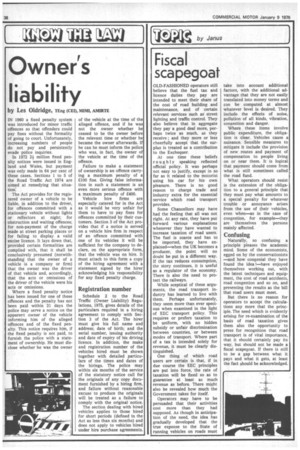Fiscal scapegoat
Page 40

If you've noticed an error in this article please click here to report it so we can fix it.
OLD-FASHIONED operators still believe that the fuel tax and licence duties they pay are intended to meet their share of the cost of road building and maintenance, and of certain relevant services such as street lighting and traffic control. They also believe that in aggregate they pay a good deal more, perhaps twice as much, as they receive ; and they more or less cheerfully accept that the surplus is treated as a contribution to the Exchequer.
At one time these beliefs roughly speaking reflected official policy. It was perhaps not easy to justify, except in so far as it related to the motorist using his car for his own pleasure. There is no good reason to charge trade and industry extra for the essential service which road transport provides.
Some Chancellors may have had the feeling that all was not right. At any rate, they have put forward various explanations whenever they have wanted to increase taxation of road users. The fuel is scarce and has to • be imported, they have explained—when the UK becomes a producer, the point will no doubt be put in a different way. If the tax reduces consumption, the story continues, it is useful as a regulator of the economy. There is also the need to protect the railways.
While sceptical of these arguments, the road transport industry has learned to live with them. Perhaps unfortunately, they seem more than ever specious when examined in the light of EEC transport policy. This requires or prefers taxation to be uniform, with no hidden subsidy or unfair discrimination between countries, or between modes of transport. Where part of a tax is intended solely for revenue, it must be clearly distinguished.
One thing of which road users are certain is that, if in due course the EEC principles are put into force, the rate of taxation will be fixed so as to guarantee at least as much revenue as before. There might also be revealed how much the Government takes for itself.
Operators may have to be persuaded that their activities cost more than they had supposed. As though in anticipation of the need, the idea has gradually developed that the true expense to the State of running vehicles on roads must take into account additional factors, with the additional advantage that they are not easily translated into money terms and can be computed at almost whatever level is desired. They include the effects of noise, pollution of all kinds, vibration, congestion and danger.
Where these items involve public expenditure, the obligation is clear. Vehicles cause a nuisance. Sensible measures to mitigate it include the provision of new routes and payment of compensation to people living on or near them. It is logical that payment should come from what is still sometimes called the road fund.
What operators should resist is the extension of the obligation to a general principle that they must pay what amounts to a special penalty for whatever trouble or annoyance arises from the use of their vehicles, even when—as in the case of congestion, for example—they are themselves the persons mainly affected.
Confusing
Naturally, so confusing a principle pleases the academic mind. Some of the economists, egged on by the conservationists —and how congenial they have found the idea I—have enjoyed themselves working out, with the latest techniques and equipment, the cost of road accidents, road congestion and so on, and presenting the results as the bill that road users must meet.
But there is no reason for operators to accept the calculations any more that the principle. The need which is evidently arising for re-examination of the basis of road taxation gives them also the opportunity to press for recognition that road transport is of vital importance, that it should certainly pay its way, but should not be made a fiscal scapegoat. If there is still to be a gap between what it pays and what it gets, at least the fact should be acknowledged.




















































































